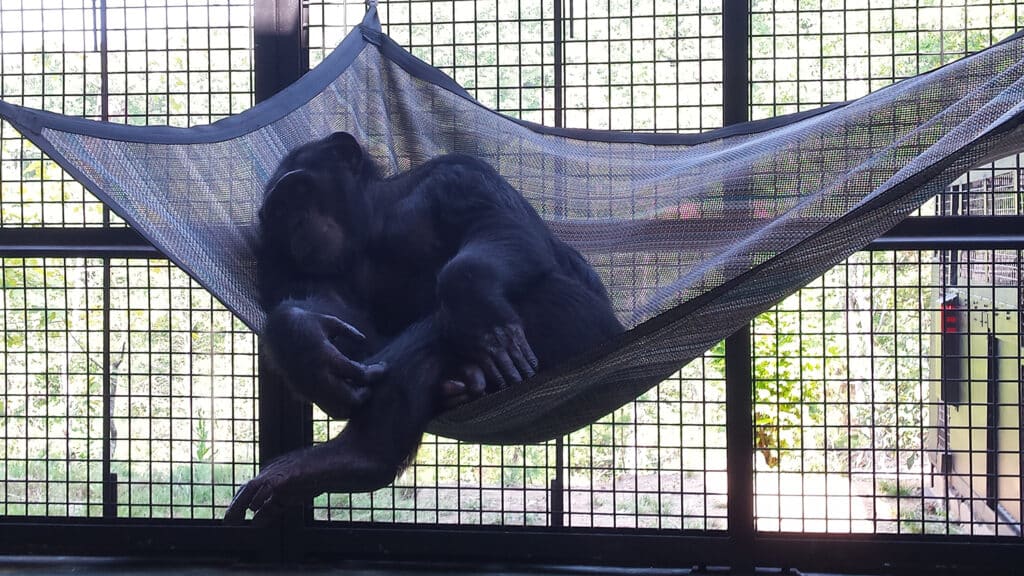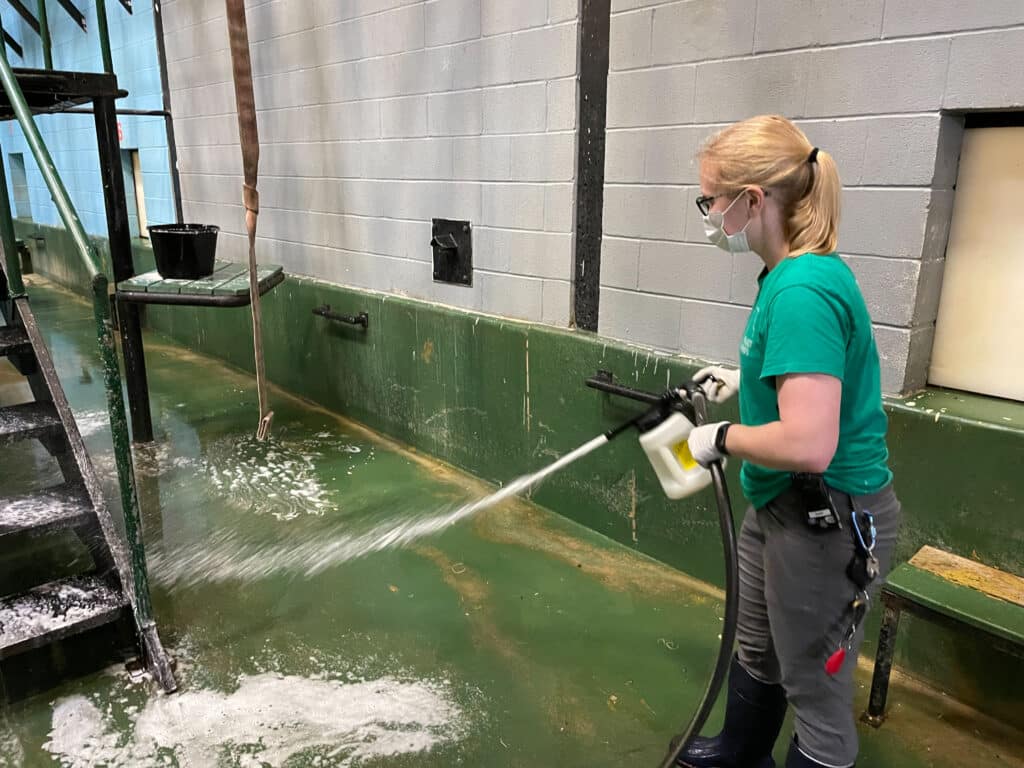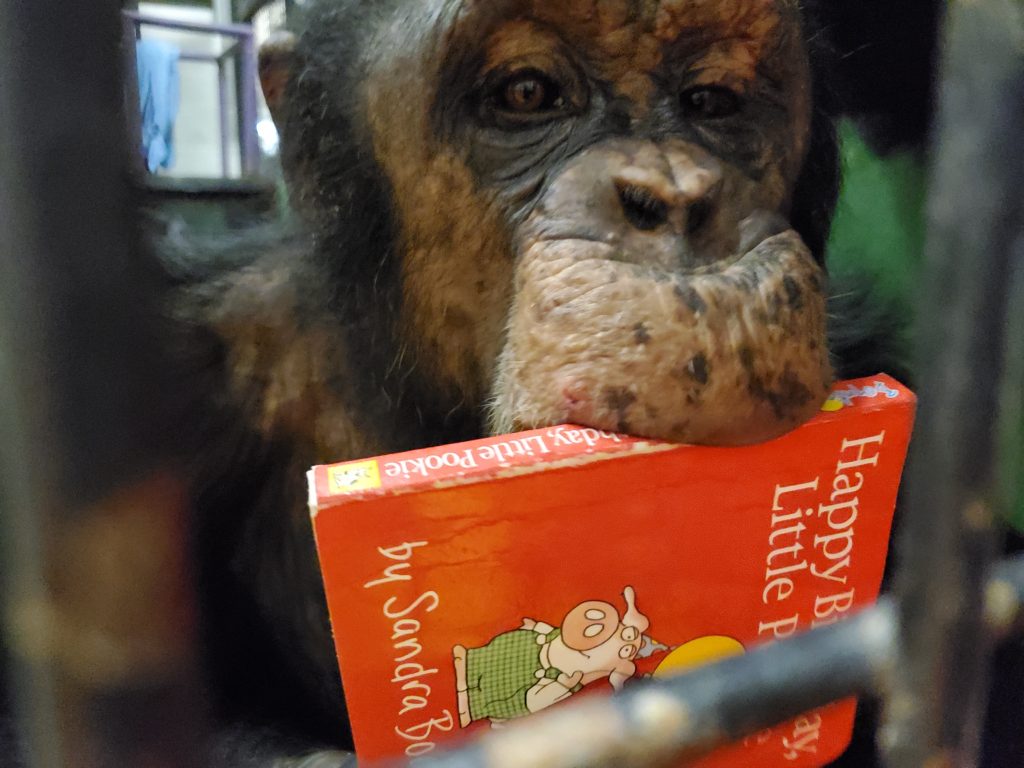
Chimp Time at the Sanctuary

By Marissa Pena
We’re always thinking about chimp time here at Project Chimps, but what exactly does that mean? As readers of the blog are aware, our mission is to provide former research chimpanzees with exemplary lifelong care. In order to do that, it’s important to provide a consistent schedule built around the specific needs of our residents.
Everything runs on chimp time at the sanctuary, from construction developments to feeding schedules. Our number one priority is making sure every chimp is happy, healthy, and free to thrive in their forever home. To learn more about daily scheduling at Project Chimps, just keep reading!
What is the Daily Rhythm like for Chimpanzees?
Just like humans, chimpanzees are diurnal, meaning they’re most active during the day. At night, chimps sleep for around 9.5 hours in nests they build on top of trees or platforms. They spend about 6-8 hours every day foraging for food, and are especially active during early morning and late afternoon.
Sam Jones is one of the caregivers here at Project Chimps. She has over five years of experience working with chimpanzees and is a great member of the team! She kindly agreed to speak to us about chimp time at the sanctuary and how we use these natural rhythms to inform our daily schedule for the chimps.
The Daily Schedule at Project Chimps
“Breakfast starts around 8:15-8:30 and usually lasts until about 9:00-9:30,” she explains. “After that, we start shifting and cleaning their enclosures. A lot of them usually take an after-breakfast nap. They get a morning enrichment item at some point to help with shifting and keep them occupied while we’re cleaning.”

In the afternoons, caregivers also simulate foraging behavior by spreading food around their habitat for them to find!
“They usually get lunch around 12:00-1:00,” she explains. “We make sure to have a forage for their lunch so they spend time searching for food like they do in the wild, and we scatter things like sunflower seeds and peanuts in the habitat so they spend time foraging outside too.”
“We come back to serve dinner at 3:30-4:30, then give them another enrichment item and some scatter before we leave. Sometimes we will do behavioral training in the afternoon, which a lot of them seem to enjoy doing. On habitat days we try to give them access as quickly as we can after breakfast, and usually they can have access to that until dinner time.”
Early Birds and Night Owls
Although chimpanzees tend to be most active before the sun goes down, that doesn’t mean all chimps are early risers! Just like we might think of ourselves as early birds or night owls, chimps have their own preferences as well.
“I’m not sure about night owls, but there are definitely some chimps who seem to not be early birds! A lot of times, Jermaine is still half asleep when we open the villa for the morning, and it takes him a while to get moving and come get breakfast,” says Sam. “Leo is also not an early bird and will stay in a hammock in Chateau until we start breakfast.”

“Sometimes if we have to stay later than normal for some reason, I’ve noticed some chimps starting to make their nests for the night. Interns who stay in the cabin can hear activity at different times during the night, so we know they don’t all sleep through the night, and they can be awake at odd hours,” she explains.
Chimp Time Normalcy
Having a consistent daily schedule is an important part of how our caregivers provide a sense of safety and routine. Many of the chimps have their own daily routines, such as after-breakfast naps and preferred grooming times.
“A good amount of the chimps seem to take an after breakfast nap while we are cleaning the first room.” Sam says. “If they have access to the habitat and it’s a nice day, they will nap out there. If they aren’t napping after breakfast, I see a lot of grooming happening. Around lunchtime is when I see playing/grooming too.”
According to Sam, helping the chimps by providing this type of routine is especially rewarding.
“I enjoy keeping them on a routine for mealtimes so they know what to expect during the day. I think it helps to keep things consistent,” she says.
Having a sense of normalcy is one way to provide for these chimps. Although we like to shake things up by offering new toys, snacks, and enrichment puzzles, our mission to provide them with lifelong exemplary care is one thing we always want them to be able to count on.
If you’d like to be a part of our mission, consider checking out our Amazon Wish List or donating today!

